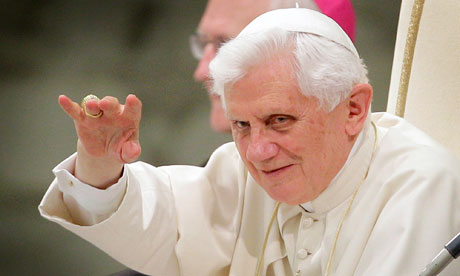 The Holy Father is 85, and as time passes so he gets older. There's been a fair amount of chatter about his pontificate slowing down and the like; liberals are beginning to look forward to the next papacy. This is dangerous talk if it means that people stop paying attention to projects close to Pope Benedict's heart, because he won't be around to reward or reprimand them for doing anything or nothing about them, or if they think they can defy him in the hope that by the time the wheels of justice grind into action we'll be into a new pontificate.
The Holy Father is 85, and as time passes so he gets older. There's been a fair amount of chatter about his pontificate slowing down and the like; liberals are beginning to look forward to the next papacy. This is dangerous talk if it means that people stop paying attention to projects close to Pope Benedict's heart, because he won't be around to reward or reprimand them for doing anything or nothing about them, or if they think they can defy him in the hope that by the time the wheels of justice grind into action we'll be into a new pontificate.But it doesn't appear to be true. He may look a little frail but look at these three important documents just from November:
the Motu Proprio Lingua Latina: a brilliant rearticulation of the reason why Latin is not just important for the Church, but indispensible: not just for the liturgy.
The address to the St Cecelia Association on Sacred Music: a brilliant refutation of the argument that the use of chant and sacred polyphony in the liturgy undermines 'active participation'.
The Motu Proprio 'Intima Ecclesiae natura', on Catholic charitable works: a firm reassertion of the necessary Catholic identity of charities using the name 'Catholic'.
These are not just reflections, each of them are calls for action, and in the first and third cases they are legislative acts which must have taken serious preparation, and will have concrete consequences.
Everyone please note: Pope Benedict is not about to disappear. And bearing in mind his mortality, the only prudent, healthy and Catholic attitude is to work on the basis that his successor won't suddenly throw everything in the air. The Holy Father's initatives are bearing fruit in all sorts of ways, and any remotely plausible successor is going to want to develop them further, not call a halt. What Pope is going to tell us to forget about Gregorian Chant? Or say that Catholic charities can break the Natural Law? Or rubbish our liturgical patrimony?
I hope Pope Benedict has a very long reign. But I'm not frightened of the next Pope. We aren't going to get some 1970s liberal. Anyone with eyes to see can perceive that Pope Benedict is moving exactly with the times: he has facilitated and channeled an inevitable and necessary realignment in the Church. The Benedictine revolution is here to stay.
Monday, December 3, 2012
ReplyDeleteArchbishop Gerhard Muller,Prefect of the Congregation for the Doctrine of the Faith, Vatican has got it right!
Traditionalists and progressives are using the same false premise in the interpretation of Vatican Council II: Archbishop Muller seems to realize it.
Heretical interpretations of Vatican Council II come with a new element added which is not part of the Faith.
Vatican Council II is not a break with the past unless implicit salvation mentioned in the text, is assumed to be explicit and known in 2012.
Archbishop Gerhard Muller's recent statement could suggest that the Congregation for the Doctrine of the Faith(CDF) has tracked the 'missing link' responsible for heretical interpretations of Vatican Council II.He seems to have detected the primary cause of Vatican Council II being considered a break with the past.
It would be clear by now, that there is no text in Vatican Council II, which says being saved in invincible ignorance, a good conscience, elements of sanctification etc are known to us in the present times.No text says that we can see the dead on earth.
So we cannot imply, as is being done in general, that these cases are exceptions to Tradition i.e the dogma on salvation and the Syllabus of Errors.
Since there is no 'known salvation' mentioned in Vatican Council II the Council is not a rupture with the past.
The Council no where contradicts Fr.Leonard Feeney's understanding of the dogma on exclusive salvation.
If the cardinal who issued the Letter of the Holy Office 1949 to the Archbishop of Boston assumed that invincible ignorance etc were exceptions to the dogma, he made a mistake.
The Letter does not explicitly say that Fr.Leonard Feeney was excommunicated for heresy.One has to imply it - and just about every one is doing just this!
The Letter refers to 'the dogma'. The text of the dogma does not mention any exceptions.It agrees with Fr.Leonard Feeney's traditional position. He was excommunicated for disobedience.
This error from the 1940's, of the visible baptism of desire, has entered into the interpretation of Vatican Council II, by traditionalists and progressives
The CDF Prefect realizes that it is heresy to consider the Council as a break from the past.It would be a break, if one used the false premise, of being able to see on earth, the dead, now saved in Heaven.
The dead-visible is not part of the hermeneutics of continuity.The Council is not neutral it is traditional and there can be only one orthodox interpretation.-Lionel Andrades
Feast of St.Francis Xavier
http://www.catholicherald.co.uk/news/2012/11/30/prefect-of-the-cdf-says-seeing-vatican-ii-as-a-rupture-is-heresy/
___________________________________________
"The Benedictine revolution is here to stay." - Too many revolutions for my taste. Better to call it roll-back of the V II revolution.
ReplyDelete